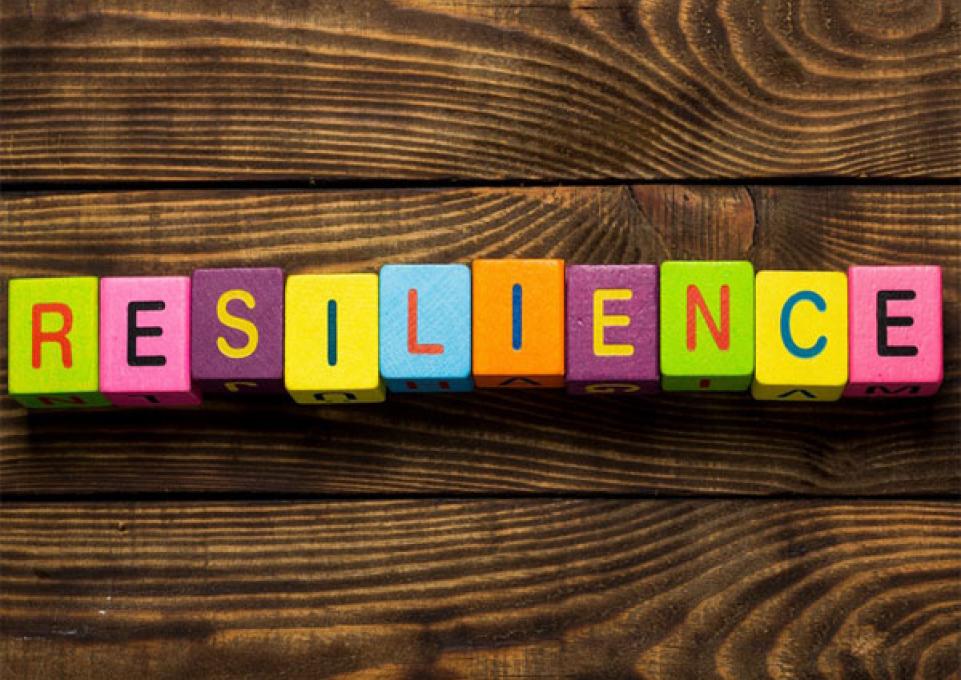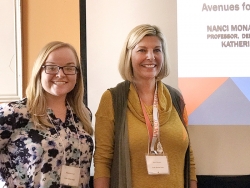
Children may face a variety of traumatic events in their personal lives, ranging from abuse in the home to neighborhood violence to having parents deployed in the military.
Because of those issues, Buffalo State started the Resiliency Project, an effort to train new teachers on how to build resilience in young learners.
Resilience also applies to many Buffalo State students who have overcome a variety of obstacles in order to attend college.
“I work with students who have had adverse experiences in life,” said Nanci Monaco, associate professor of Elementary Education, Literacy, and Educational Leadership and a child psychologist. “We’re trying to foster resiliency in our teacher candidates, as well as to teach them how to do this with their own students.”
By examining children's previous experiences and looking at college students who have “beaten the odds,” practices that help individuals succeed can be identified, Monaco said.
“We’ve used some of their own experiences to talk about ways that they were able to get all the way to college,” said Monaco. “We explore some of the factors that buffered their negative experiences and helped them to minimize trauma so that they were not debilitated.”
 The adverse childhood experiences that some teacher candidates and their future students have faced are diverse. “These include refugee resettlement due to escaping violence in their country of origin,” she said. “We’re also helping students cope with past exposure to violence—such as witnessing shootings, gang violence, and physical abuse. The number of children in the Buffalo Public Schools who know someone who has been killed or wounded due to violence is immense.”
The adverse childhood experiences that some teacher candidates and their future students have faced are diverse. “These include refugee resettlement due to escaping violence in their country of origin,” she said. “We’re also helping students cope with past exposure to violence—such as witnessing shootings, gang violence, and physical abuse. The number of children in the Buffalo Public Schools who know someone who has been killed or wounded due to violence is immense.”
Buffalo State’s Professional Development School (PDS) Partners in Western New York, in conjunction with the School of Education, are developing curriculum and conducting in-service training regarding fostering resilience in young learners. Elementary Education faculty Pixita Del Prado Hill and Keli Garas-York are leading the PDS efforts in resiliency.
The project also looks at how to work with pre-verbal children who have experienced trauma, Monaco said. Art and music therapy are useful tools with this population. Early childhood education lecturer Kathleen Dust assists teacher candidates in developing resiliency curriculum and practices for preschoolers.
Throughout the semester, the Resiliency Project sponsors speakers, film screenings, and discussions on fostering resilient learners. In the spring, the program will screen The Sentence. The film deals with how government policies such as three-strikes laws and mandatory minimum sentencing for drug offenses impact families, especially mothers, and how new sentencing reforms may minimize trauma experienced by children separated from their parents for extended periods of time.
“There is a long list of other areas that could also be examined,” Monaco said. “For instance, fostering resiliency in children whose parents have both been deployed...What might that look like? There are also issues of resilience related to children displaced by natural disasters. Educators play a key role in the resumption of a normal routine, known to lessen the impact of trauma.”
Sometimes the adverse childhood experiences originate in the home, but sometimes they are societal. For example, mandates like active-shooter drills may traumatize children in the classroom, particularly those with a prior history of crises. “That’s very scary to a child who has anxiety,” she said. “How can you make such mandated drills less scary for children?”
Conducting active-shooter drills in a calm manner, focusing on following established, familiar, predictable procedures, can minimize psychological stressors, Monaco said. Emphasizing that the same procedures would be followed in other emergencies such as tornadoes, gas leaks, and fires can alleviate children’s stress. Fostering a sense of control over one’s environment is known to instill resilience.
“It is important work because of what’s at stake”, Monaco said. “We think that over half the children in a given class have experienced some type of trauma.”
When not addressed, these adverse childhood experiences turn into physical ailments and lives of inferior quality, according to new research.
The next phase of the Resilience Project involves teacher-candidate trips to partner schools that serve specific populations of children with extensive adverse childhood experiences, such as schools that serve homeless populations and children relocated after natural disasters.
Inline photo: Literacy graduate student Kat Knauf and Nanci Monaco, associate professor of Elementary Education, Literacy, and Educational Leadership, presenting on the effectiveness of New York State anti-bullying efforts at the New York State Association of Teacher Educators fall 2018 conference in Saratoga Springs, NY.
